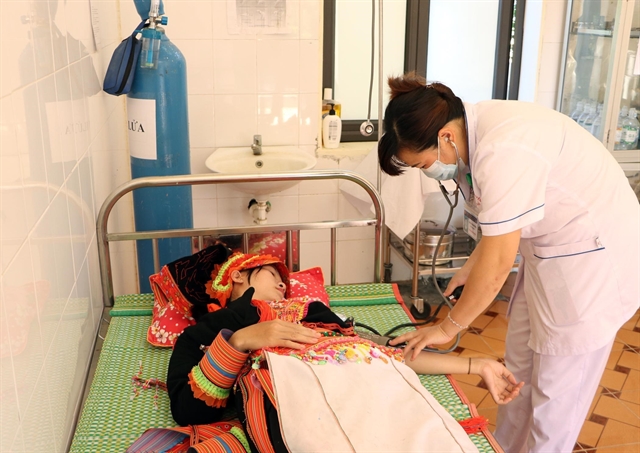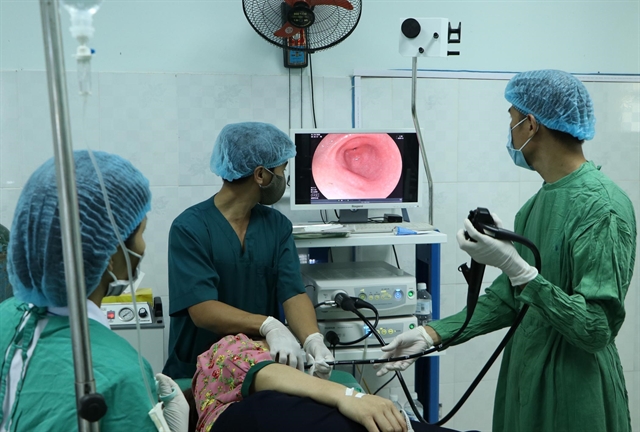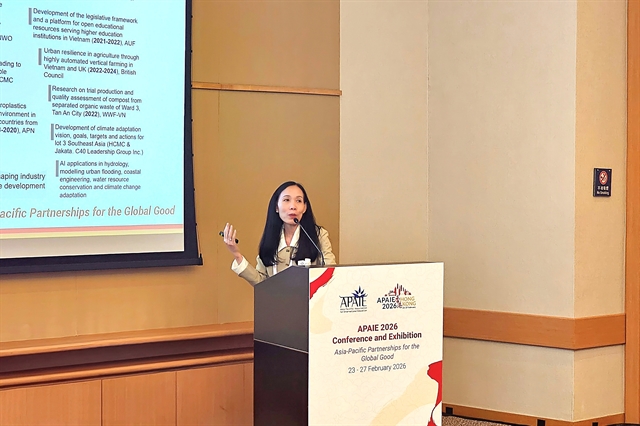 Society
Society


|
| A doctor from Ma Ly Pho Commune's health station checks the blood pressure of a local woman in the northern province of Lai Châu’s Phong Thổ District. VNA/VNS Photos Quý Trung |
LAI CHÂU — Tẩn Sa Dấu, a pregnant woman from Ma Ly Pho Commune in the northern province of Lai Châu’s Phong Thổ District, feels happy that she no longer has to travel long distances for regular check-ups.
“For my last baby, I used to go to the district hospital for examinations, and that's where I gave birth.”
However, she said this time she would use the commune’s health stations because they were fully equipped with adequate facilities and enthusiastic, thoughtful nurses.
“It helps save money and eases the hardship for me,” she said.
Dấu is among many local residents who have benefitted from a project aimed at giving people better access to quality healthcare closer to home.
In the past, when a member of the Dao ethnic group was sick, they called the local medicine man to perform rituals with the belief he could heal the person, or go into the forest to collect plants to use as herbal medicine.
Only when people became seriously ill were they sent to hospital. Sometimes, it was too late.
To gain people’s trust in medical treatment at grassroots level, Lai Châu Province had upgraded health stations at commune level as well as health clinics in the region, according to Dương Ngọc Hương, director of Phong Thổ District’s Healthcare Centre.
Medical staff have also been assigned to attend training courses to improve their professional skills.
Hương said 13 out of 17 communal health stations in the district had so far met national standards.
Investing in quality primary healthcare had contributed to improving the treatment of ethnic minority people in the locality, he said.
The average birth rate had been reduced to 0.66 per thousand per year, about 93 per cent of children under 1 were fully vaccinated and health insurance coverage had reached over 95 per cent, Hương said.
Positive changes have also been reported in Than Uyên District.
Vũ Văn Quang, director of Than Uyên's Healthcare Centre, said about VNĐ40 billion (US$1.7 million) had been spent on modern equipment for the centre over the past five years. Medical staff had also been trained on how to operate the new facilities.
He said the centre performed endoscopic surgery on 100 patients a day on average.
Every day, the centre provides check-ups and treatment for 200 - 250 patients, including those from neighbouring districts in the provinces of Lào Cai, Yên Bái and Sơn La.

|
| Doctors perform gastrointestinal endoscopic surgery for a patient at Than Uyên District Healthcare Centre. |
Sharing his experience of surgery, Nguyễn Văn Bách, a resident of Tân Uyên District, said he was on his way home from Mù Cang Chải District (Yên Bái Province) when he started experiencing severe stomach pains. He was taken to Than Uyên District Healthcare Centre for emergency treatment.
“Doctors quickly examined and diagnosed a gastric perforation, and decided to operate on me using modern equipment. Now I am fully recovered,” he said.
Nguyễn Văn Đối, director of Lai Châu's Health Department, said investing in modern facilities and training health workers had enabled them to provide better healthcare services and reduced the number of patients seeking treatment at higher-level facilities.
Previously, patients with fatal diseases requiring hi-tech treatment had to be transferred to central care facilities.
It was quite a burden for ethnic people who already suffered hard lives, he said.
Đối said in the future, the department would strengthen training to enhance medical staff while continuing to upgrade facilities and equipment, ensuring people had access to good medical care near their homes. — VNS




